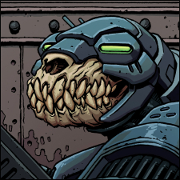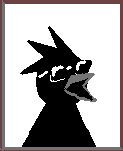|
I’ve run several games here on SA, and I’ve got to say this is the best community I’ve found for it anywhere. My particular preference has always been CYOAs, ever since the days of Microwave, Microbe and RBY way back when. Once the Game Room was created, and more traditional games started being run online, I was delighted to be able to read through other people’s campaigns, to see how their characters were created and developed through gameplay. I just ended my fourth (or so) game in the game room, and a few of my players asked me to do a little write up of my process and thoughts. I’ll get into that now, but more broadly I also want to see if we can use this space to develop games specifically for PBP using these lessons. I’ll jump right into it! LORD OF THE TOWER Lord of the Tower was meant to be a quick game, something to ease my nervousness about running something like that publicly, and frankly I didn’t at the time know of a lot of game systems besides Dungeons and Dragons. I wanted to keep things simple for the players and for me, so the characters were very barebones. Resolution was simple d20, with bonuses for a few specialties chosen by them (as vague as Dancing, Lockpicking, or Interior Decorating), and a more powerful technique called a Talent. Talents could be just about anything they wanted (and this varied tremendously, from the cheesily overpowered to the amusing and clever) and required a d4 roll. Success or failure, it couldn’t be used again for 4 turns. Simple character creation drew a lot of players, and I (foolishly) decided to simply take everyone! After all, I’d never done it before and didn’t know any better, and unlike real life play PBP allows for enormous groups to play at the same time. This worked pretty well - the narrative was designed to allow for huge groups of contestants from various backgrounds to be entering all at once, so there weren’t any clashes between the story and the mechanics in that regard. It also worked in cushioning the expected attrition of players - even when some dropped out, the game could go on. In character creation, players were also asked to write a simple AI out for my use if they ever couldn’t post or flaked out, so I could continue rolling for them even without their presence. The game space was presented as different floors of a crazy magic tower, so there were discrete beginnings and endings to each section. As players hit new floors, recruitment would open again, so people lurking the thread had the opportunity to join in - and play through the floors the other players had gone through, dealing with the changes they’d made to the playing field. This was well received, and ensured even players whose characters had died could simply pop back in. But even death wasn’t the end for players - in the interim while waiting for recruitment to open, the ghosts of those who died could nudge the rolls of survivors for better or worse. The game ended on the 27th floor of the tower and the heroes won and became gods etc etc, but we’re not here for the story. The question is, what did my experience tell us about PBP gameplay.
Player Retention There’s lots of reasons people stop playing: they get bored, they can’t keep up the pace, they start to hate their characters. Lord of the Tower was designed to try to mitigate some of this. By planning from the start to allow AI actions, players who couldn’t be certain they could get things done on time had a safety cushion that would still allow them to participate when they were able. Character death (or retreat) meant that those who were bored with their avatar could swap for something new. Finally, open recruitment meant new blood could always replace those lost. Either way, the game never stopped moving. Modular Narrative By breaking the tower into floors, there’s a sense of achievement for players who managed to survive them. If they died, they’d have to restart, but they’d have a better shot at surviving from their experience. From a GM perspective, this allowed me to write out a bunch of different scenes in advance and sort of slot them in as I felt like it. More importantly, it gave the implication of a final goal to the game. HAVE AN ENDING Very, very many games in the Game Room peter out because there’s no actual goal in mind. Even otherwise successful games drag on because neither the players nor the GM know how long they’re actually going to be playing it. It’s less stressful for everyone to know that there’s a final goal in mind and then to count down towards it, and people seem to really appreciate when they can see their plans come to fruition. This also ties into the Modular Narrative - if they do it properly, the GM can end their game early if they're getting bored or overwhelmed, or add more modules in the middle. Audience Participation Another aspect that only really shows up in PBPs - there’s an audience! In between recruitments, people would roleplay as people outside the tower waiting to get in, and at several points I opened up world events to lurker voting. Keeping them excited and involved meant there were always people willing to hop in and keep the game moving. The ghosts of dead players also sort of fell into this category - they weren’t really playing anymore, but their powers (though limited) were hugely influential to those who were, and in several cases living players tried to curry favour from them. The Fragile Gods of Somewhere was my next big game, and arguably my most popular even now. I took the lessons I learned from the earlier game and expanded upon them, making something that really resonated with people. Long story short, players were would-be Gods who happened upon (or created) a world to play with. I had them pick foundational elements which the world was composed of (Water, Silver, Milk, Glass and Dice rather than the traditional four) and had them roll off to see who would get in. Only five people became Gods, but the others remained in the narrative as Wisps, unable to make actions on the world but able to affect the Gods themselves. Mechanically, the Gods rolled 1d20, and Wisps could vote each round to add or subtract to those rolls. When a Wisp voted, they gained one pip of power, which didn’t affect their votes… but DID improve their chances to get in the next crop of Gods. Because the Gods were Fragile - rolling too low (or having your action voted too far down) wounded them, eventually killing them if they went too far. Each Age (the module in this game’s Modular Narrative) had four rounds, and whether or not the Gods were alive at the end of the Age they died then - but the stronger they were the better the treasure they left behind for their People. It worked pretty well in practice. Player Retention came from making it very, very easy to post and act, requiring little thought to strategy and basically just giving them free reign to do whatever they want. The modular nature of the gameplay also meant the commitment required for each God was very low, only a few weeks, but the effects of their choices would ripple down through the rest of the game. I don’t think we ever had anyone flake over the year the game ran. The game ended after eight Ages, bringing in 32 Gods in total, each of whom, success or fail, had an effect on the world. As the game (and the technology levels of the People within) proceeded, even the Wisps eventually gained the ability to talk to the People and make changes to their culture passively. The game ended and had an epilogue that tied together all the various threads the players had made and concluded things satisfactorily.
Incentivization Wow, this one was a huge find. People love watching numbers go up. If you give your audience an incentive to participate, you will never lack for people wanting to get in on the action. This isn’t applicable to all games, but if you want to have a large group available this is probably the best and easiest way to retain them. Break Down That Gate is my most recent one, and in many ways is a cross between the LotT and Fragile Gods. Each player controls a soldier in an army with a particular skill, and together they all have to trek across a bunch of land to go break down a crucial gate. Mechanically, everyone rolls a d100 and states how they want to react to a specific situation, with narrative bonuses if they bandwagon on a few specific tactics rather than spread out. Every time they post, they gain a +1 bonus to their roll, but whether or not they post their personal die is rolled in support of the army. This worked really, really well. We had (at the peak) approximately 40 people playing concurrently, and even by the very end of the game we had 20 regulars. Posting means your character grows stronger, which means they have more effect on the narrative, which incentivizes further posting. But since I focused on individual soldiers who rolled highest in their specific tactical group and since a d100 is really, really swingy, almost everyone over the course of the game got their chance to shine. By game’s end, every single character was well fleshed out, with histories and interactions and friendships and rivalries. It was very satisfying for me personally, and made the game world feel more ‘real’.
Have a Discord I was leery about Discord, because I like seeing discussion on the forums, but in practice it made a huge difference in the feel of the game. Instant communication of ideas between players meant that for those reading and lurking the gameplay is seamless, making the whole thing look and feel really polished. Discussions and guesses within the channel can also be incorporated into the narrative - the central mystery in the game was basically the result of me listening to the players chatter and building up around their assumptions, which made them feel clever for figuring it out.  WHAT DOES THAT MEAN FOR US YOU NARCISSIST WHAT DOES THAT MEAN FOR US YOU NARCISSIST Right, as much as I could talk forever about my own stuff, I want this to be a more general discussion spot. There are lots of really good systems out there now, far better than D&D is for this. PDQ, FATE, PBTA games, all of them are well suited for PBP or live play… but none of them are made for this format. There’s stuff here that can’t be done elsewhere, and stuff that shouldn’t be done here. I’d be interested in seeing what a system made for this niche looks like, and I’d like to hear your thoughts on it. For instance, it’s very easy to flake out of games online, and yet there are often more people who want to play than get into any given game. Would an ideal PBP then embrace these crowds and incorporate them into the game? Is the continuity of the game world more important in PBPs than any individual player, and if so how could the mechanics support and reinforce this? I’ve given a few examples - what do you think?
|
|
|
|

|
| # ? Apr 27, 2024 14:57 |
|
I ran ImpGame a while back that seemed to go OK. But a lot of what I think worked well was I enjoyed it a lot, Everyone who participated was amazing :-) I do have some thoughts on scope creep following the game, especially seeing some other games stall out fairly quickly. I seen how easy it is to get yourself in a situation where you feel out of your depth, even in a paddling pool you made yourself. So hopefully some of below observations and examples are useful to people. I went into ImpGame with a clear set of goals and expectations so as to keep myself focussed, keep the game on track, on schedule and under control. I wanted people to have fun, but that included myself. Here are those goals, and how they got shifted, ignored, and broken. By me. Oops. NUMBER OF PLAYERS Open recruitment I wanted an open recruit thing, BDTG style, since I liked how people could drop in and out. Casual, open for new players. I only expected maybe 5 or so people to try it out, but in the end 26 people had made an IMP and participated in at least one turn. Which is great! It was really nice so many people participated. This is not so much a problem on its own because ImpGame's rules were pretty simple, but it had some knock on effects. Players blasted through the primary tasks super quick, and the art requirement increased (more on this below). Takeaway: If leaving player recruitment open, have a plan on how to deal with an unexpected uptick. If you made resourcing promises or plans based on a much lower (or higher) number of players, be prepared and willing to adjust them so you can manage. Be realistic with what you can manage. POSTING FREQUENCY Updating Tuesday and Friday. This was based on how much I expected to write per update, how much I expected to draw per update, and how much free time I had when starting the thread. When each of these changed, I did not re-evaluate, and so always felt I was late, under pressure to work on the next update. Takeaway: Have clear expectations of yourself to keep the game progressing. BUT if you can't manage, communicate this and set more reasonable goals. If you burn out, the game ends, and no one wants that. SET TURN LIMIT 7 days, 7 nights, 7 turns, 7 updates 1) I decided to add interim updates- point of view posts from npcs to keep player attention inbetween updates. I really liked this as part of the game, but I did not include it in my original update projections. It did take time away from writing other updates, but I think it was worth it. 2) Adding another day was something shifted by the players, and a change I was actually happy with. Player actions added an extra day, BUT this was limited to a single extra action, letting people tie up loose ends. I think the limited nature of it is what made it work. It worked as part of the story, it worked as a part of the game, I'm all round happy it happened. Takeaway: Changing your plans can be fine, as long as this is within manageable limits. Make sure you understand what these limits are, and how much extra time/energy you need to invest to get a new thing working. SET AMMOUNT OF ARTS DRAWN Each player gets one IMP avatar drawing, made from a simple template, and updated as they unlock additions. That was great! Something i really liked from BDTG and Wrecking Crew both. Fun, easy, and let players customise their character look. I think the imp arts were a nice draw for people, even though they were pretty basic. And the simplicity of the template worked when scaled up with lots of players. BUT Each in game day, a single picture with the workshop would be posted, with the previously created IMP drawings copy/ pasted on top of a set background. Each Player would then get their imp's action visually represented in the workshop. This quickly got out of control. As people acted in other locations, I continued to draw each imp acting, but now multiple images were needed. Then, instead of simplifying to manage this, I started making animated gifs of increasing complexity. Nothing major or anything, all simple stuff. But it took time, energy, and effort far above what I had planned. Each update I felt needed more drawings, more gifs, more stuff. Delays and pressure resulted. If everyone on the discord wasn't so chill and supportive, could have easily burned out due to this self imposed requirement. And it was self imposed, no one was asking me to do doodles, no one was shouting for gifs, no one was pushing for anything. Takeaway: Set reasonable expectations of yourself. If things are drifting away from a manageable plan, take a step back and reevaluate. What would make it manageable? Adjust your timings? alter your planned outputs? change limits on player actions? SOLICIT SUGGESTIONS FROM THE PLAYERS. They probably want the game to continue, and will have good ideas. Everyone in ImpGame was really understanding and helpful, and I'm sure people are the same in other games. But people can't meet you halfway of you don't tell them. So, that's my thoughts about how I let ImpGame, (a really rules light, simple game with straightforward rules and interactions, and copy/paste arts) get away from me a bit. Hopefully this helps other people avoid these pitfalls 
|
|
|
|
A lot of this is absolutely my experience with PbP as well, especially having distinct modules/milestones, clear progress towards an end, and some kind of audience participation. I'd also add aesthetic unification (like the art you make for your games) and game-created artifacts (like maps, histories, languages). The former helps tie players together as a single group, while the latter gives them an ongoing sense of achievement, as in "this is what we've built so far". There are a few games specifically designed for periodic online play, such as A Doomed Pilgrim in the Sundered Land, but I suspect there's a larger pool of games designed mainly for tabletop that work well (possibly even better) in PbP because they tap into some of these features you describe, as well as other aspects that your games don't really use. Your games give everyone almost freeform-like control over exactly one character, but I've also had or seen a fair amount of success with games down the other end of the continuum, like The Quiet Year and Microscope. These turn-based games give players complete, but brief narrative authority on their turn, and have them share characters and settings. Meanwhile, there's always a lot to build on, with large casts of characters and multiple narrative threads happening on any given turn. This helps keep both the story and the game flowing - people can pick and briefly expand on something that interests them and advance the overall story at the same time. This common control seems to increase people's buy-in, though you can definitely get a similar effect without sharing so much (like PbtA games typically do with simultaneous character creation and world-building). A completely different route is turning conventional RPGs into CYOAs, offloading all the mechanical and narrative bottlenecks onto one motivated writer and letting a collaborative audience take care of (some degree of) the decision-making. I guess that gives us at least 4 general modes of play:
|
|
|
|
I have nothing interesting to say or add but I sure do love playing them forums games oh boy
|
|
|
|
Theantero posted:I sure do love playing them forums games oh boy
|
|
|
|
WereGoat posted:ART STUFF UnCO3 posted:There are a few games specifically designed for periodic online play, such as A Doomed Pilgrim in the Sundered Land, but I suspect there's a larger pool of games designed mainly for tabletop that work well (possibly even better) in PbP because they tap into some of these features you describe, as well as other aspects that your games don't really use. Your games give everyone almost freeform-like control over exactly one character, but I've also had or seen a fair amount of success with games down the other end of the continuum, like The Quiet Year and Microscope. These turn-based games give players complete, but brief narrative authority on their turn, and have them share characters and settings. Meanwhile, there's always a lot to build on, with large casts of characters and multiple narrative threads happening on any given turn. This helps keep both the story and the game flowing - people can pick and briefly expand on something that interests them and advance the overall story at the same time. This common control seems to increase people's buy-in, though you can definitely get a similar effect without sharing so much (like PbtA games typically do with simultaneous character creation and world-building).
|
|
|
|
Dog Kisser posted:I can vouch for The Quiet Year being a hell of a fun game to play PBP, but even there the need to use an external service to create the map and draw the cards (which would be a lot easier if people were all sitting together around a table) raises the barrier to entry - if you only have a few minutes a day to post and/or need to phone post and can't get access to Roll20 it can make it difficult to want to post. I wonder if there are tweaks to TQY that would make it function better online? A Doomed Pilgrim is a textbook perfect example, though. Audience participation makes it well suited to online play, and it's easy enough and not reliant on any particular player to keep going. As long as the GM is writing, the story can keep going - until you either die or survive! Re: Doomed Pilgrim, it works well, but it's also focused on just one character. I tried setting up a multiplayer adaptation after the first Doomed Pilgrim game I ran, but it died pretty quickly despite having a decent audience before. What ended up happening was that the most engaged audience members from the Doomed Pilgrim game signed up to play it, leaving us with a much less involved audience. I don't know if that would happen with a standalone multiplayer game, but you'd definitely need to pull in more people than for single-player. - Building on what you said about modular storytelling, I think there are other ways to use that idea in designing or running a game besides having modular chapters: firstly, anthologies of short stories played out using the same set of mechanics; and secondly, stories played out with a rotating, overlapping cast of characters who weave in and out of the audience's view. Either case might have an overarching story, but could also express a common theme or take place in a shared narrative world. That allows people to leave or end the game (or set a time in the future for it to end) without compromising it as a satisfyingly complete and coherent piece of fiction. I'm thinking something like Stories from the Grave (a pulp/weird horror anthology game) or Sojourner (an RPG inspired by the videogame Journey, with the option for characters to drift in and out along their journey). - And then building on what you said about discord, I think a hybrid of PbP and discord opens up a lot of design space for online play where you can get the advantages of both for different modes of play in the same game - the time to think, edit, and distill ideas that you get with PbP, plus the instant feedback of discord (or any chat service). For example, there's a game of Microscope currently running that's using a discord for the IC parts where you play out history on a personal level, and posting directly in the thread for the OOC parts where you write history from a top-down view. I'm running a game of Fall of Magic here in a similar way - the game is built of individually-narrated scenes, so either a player can write up and post a short scene themselves, or they can take it to discord and play out a scene in conversation with someone else. In both of these games the discord scenes get collated and posted when they're wrapped up, so really, the discord is just there to speed things up rather than being integral to the game. This isn't really a new thing - people have been doing this for a while with IRC - but discord is in my experience more user-friendly and more commonly used in general.
|
|
|
|
 https://forums.somethingawful.com/showthread.php?threadid=3835049 So I write a CYOA by the name of Blake Island School of Magic. It's a game done in Shadowrun fifth edition. As much as I love Shadowrun, it's abandoned part of what made it cyberpunk while keeping the aesthetics. I'm going back to cyberpunk's roots by taking on politics, specifically fascism, racism, class, poverty, corruption and also adding in the themes of community and nature into the mix. This is a story with these themes, but I don't moralize directly at you like some sci-fi book from the 1960's or 1970's. Instead, I look at all of these themes through the eyes of young people, hence the name Blake Island School of Magic. The story started because I grew incredibly, incredibly ill and wanted to polish my old skillset as a professional writer. I wasn't Chaucer by any means or on the NY Times best seller list, but I filled my fridge with groceries and paid my rent for a time as a writer. And I wanted to take a stab at something outside of the big moneymaker genre that I used to write (romance). I expected to write something that's maybe 20k words. A novelette basically. The story has ballooned into five books and within the next few weeks I'll be starting book six. These are not pulp novels either. I'm someone who knows his way around a story writing seriously about politics, power, race, oppression, all that jazz, which were my fields of study in college and for a while I worked in politics as well as the equivalent of a foot soldier, so I got to see how the sausage was made. Blake Island is my passion project. If I were working for CGL they would not let me make this or allow me to make the changes that I do. A lot of these are aesthetic. But the main problem as to why I wouldn't get a green light from editors is because this story in the Shadowrun universe is not about shadowrunners. It is about young people dealing with a world which is at times hostile and indifferent to them. They come from harsh backgrounds and I've thrust them into a school that teaches magic (specifically shamanism) to the children of the corporate elite, because you don't really get to pick your magical affinity. And the friction between them and the elite boils over at times. I wrote this starting in 2017 as a way of processing my feelings of Trump being elected as I write a lot about fascism. The world suddenly stopped making sense and was run by people for whom cruelty was the point. So I went back to the last time that this was a serious problem and this was the 1980's. The days of Reagan. Cyberpunk emerged from this time and Shadowrun was part of this. Often silly, often violent, often over the top like a show from the 1980's, I decided to explore the themes that are present in Shadowrun instead of merely hosing them down in bullets and calling it a day without actually needing to think about them too hard. Plus at most tabletop groups you're going to have someone, possibly multiple someones who are flat out not going to want to explore these themes because they conflict with their own political ideologies or they just want to play an ork with a samurai sword. To each their own, but because I'm writing it I get to do what I like. What did we learn? How to be a better writer Over the last year and a half I've sunk probably ten-thousand hours into the project. I'm an obsessive storyboarder and for every thousand words you see (which takes me about an hour) there is probably about five-hundred words of storyboard or rolling. So most of the chapters are extremely tightly scripted and have a polish that makes me proud. And because I'm running this in Shadowrun fifth edition with characters sheets and everything, I'm able to do a full simulation. Shadowrun is a mess of a system, but it has rules and splatbooks for just about everything. So I will run social and the occasional combat encounter pulling no punches. Success and failure are not chosen by me beforehand nor does the thread have full control either. I'll get to this down below. But because I roll dice for just about every social encounter with stakes, it takes a lot of the load off me narratively and I respond to the dice and thread decisions. It means that instead of focusong on what everyone is going to do, I roll dice and puzzle out an interesting story. The social guy is going to be smooth and talk people into stuff. The slightly awkward huntress with the reputation that overshadows her by far won't have much of a chance in talking to Joe Average, but where she's known people treat her with respect. And the nerdy spellcaster sucks at talking to pretty much everyone. And I mention social stuff because about 75-85% of rolls are social. They don't shoot their way through life. Etiquette is perhaps the most used skill, though when the knives need to come out, those combat skills are super important. In any case, I've just become a better writer by sinking in the time. I enjoy writing this and want to continue, but also want to start my own books once again. I'm think fantasy and I'm probably going to continue a CYOA series of mine that is on hiatus. Audience Participation So unlike most CYOA's, I don't normally give a discreet list of decisions to choose from. The rails (usually) don't exist. There is a direction that I want the story to go, but if people want to take a detour, I go that direction. So for example in the book I'm currently writing (book five) the thread wanted to have a reprisal raid on a human supremacist stronghold as they were targeting another character for what happened all the way back in book one. That was not my plan. Instead of saying no and digging in my heels I worked with it and pushed a different shadowrun (basically a mercenary job) to a different book. Also in that same book when people responded to who I thought was going to maybe be a third string character, I upgraded her to secondary character, of main character adjacent because she was so well liked. I'm responsive to the thread and I take direction from them because they often genuinely have better ideas than I do or offer nuggets or interesting facts or wisdom that I don't personally possess. Priorities change Part of writing teens and being invested in them is that the thread's priorities change. Problems are not solved by murdering people, though beating the hell out of people is a solid, go to tactic. It turns out that murdering people for regular people (if powerful) as a problem solving technique is a big deal. To date, none of the characters have killed anyone through a choice of the thread despite that probably being the easy choice in the short term in a game and genre where life is considered cheap, if not often worthless. One of the most interesting choices that happened early on was getting the character educated where she was illiterate and uneducated before. Solving one of these would have been necessary, but the thread threw themselves at the problem of the character not being educated. In a normal game of Shadowrun, those experience points buying off those bad qualities probably would have been dumped into stats. In this story or game, what have you, she learns not only how to read, but is excited about educating herself. And there have been times where educating herself has been critical to the survival of herself and others. What do I wish I did differently? At the beginning I lifted two concepts from other people. One was a named character, though just the name and a distinctive phrase from Eclipse Phase. These things bother me. In my defense I wasn't taking it seriously at the time and I don't do that anymore. I was also constantly dizzy for about two weeks straight at the beginning and I blame that partially on my bad decision making, though not all of it. Mea Culpa. Also, and I realized this about a month into writing, people could make distinctions between Harry Potter and my story because it's about a magic school. I am kicking myself for this, but also enjoying it to an extent at the same time because it means that there is a built in interest. So instead of having wizards wave around wands and shout nonsense, stop learning core classes like math, science and English at grade six, I actually have them do that. Also I know a thing or two about shamanism and shamanic practice and I play that straight. I don't straight up lift the religious practices of other people because I find that offensive, but many nature worshipping religions share commonalities and I've built a rough ideology based around isolation and understanding ones' place in the food chain. Not religious, but primal. They haven't delved too deeply into that yet as they're still learning the basics, but they'll start delving into that come book six and seven. Also I'm still crap at editing. I wish I was a better editor.
|
|
|
|
Maybe this would be a good place to ask if anyone knows of any PBP D&D threads that were really well done (or are still ongoing but really well-written). I'm bouncing around doing one myself, even if it is probably a terrible idea. Definitely going to read through the threads linked here already just for general ideas.
|
|
|
|
Oh hey, its the Play by Post theory thread. I have no post mortems to share but I do have some loose ideas rattling in my head. I have been involved in Break Down That Gate and Impgame, and I agree with the conclusions Dog Kisser and WereGoat made. Not much to add there. Instead I'm going to share my thoughts on developing a system meant for PbP. Also: WereGoat posted:SET AMMOUNT OF ARTS DRAWN Seconding this. Its easy to get caught in the cycle of feeling you need more and more illustrations until you are doing something crazy. - Now, I am currently on and off running Above/Below, a Fragile Gods clone. Its still ongoing, but recently I have been doing a lot of thinking about other game systems, largely inspired by DogKissers Break Down That Gate. BDtG has been very enjoyable for how it has brought a large number of people together, as it allowed for anyone interested to make a character and participate as much as they wanted. That open recruitment is something I liked much. I have been thinking of a game following it's general structure, but with major differences. Something I have been wrestling with, is the subject of rules in general. BDtG had a decidedly narrativist focus. The rules served as a loose framework for a creative writing exercise. Just enough to tell you when to roll dice to add an element of randomness. And while creative writing is great, I keep thinking to myself, is it possible to introduce more "gameness" without losing that? Can you define such game with enough rigor that its possible for a player to make predictions about the future and plan for that? In BDtG, role playing your character was a central focus. But in addition to that, many people had fun theorizing about the best plays to make, the best items to acquire, the best skills to develop. I feel like that element of trying to fight the odds added a lot to the game. But in the end none of it mattered that much. Losing was never an option. Indeed, the one case of multiple player characters getting killed was retconned away because it really was not an outcome anyone wanted to see. So what was the point of the struggle? The one thing really being strived for was the GM spotlight resulting from high dice rolls. And that is a valid thing to strive for. And the character building did serve a purpose, that of self expression. Ultimately, having your character have a +30 to rolls involving digging was less important than having your share of the narrative revolve around digging. So, was the importance of numbers a mere illusion? Much like the clunkiness of D&D often leads to people houseruling rules away until they are doing freeform roleplaying only vaguely informed by the rulebook. That can be fun, but it feels dishonest to me. Inefficient. And many games have solved this issue for the better. A good example being Apocalypse World and it's descendants. Their rules are built around generating a specific kind of story, and they contain no cruft unrelated to that. They are simplified down to what really matters. But I keep thinking, back to the style of BDtG. Is it possible to make a similar mass player system with enough rules depth to make planning and mechanical differentiation of your character meaningful, while still not losing that creative feeling of looser systems? I fear that if there are too many rules to consider, the players's focus is going to shift away from the fiction and to the rules themselves. The difference between roleplaying and boardgaming I guess. But then again, plenty of roleplaying games have a lot of mechanical crunch and people have fun playing characters in those so maybe its not a big issue. Now, one game that has done mechanical depth in PbP is Bee Bonk's Wrecking Crew. It has gameplay strictly defined by it's rules, allowing players to make plans and predictions. It achieves many of the things I'm interested in, but also has quite different focus. Instead of collaborative, it has players competing individually. Can we take the mechanical depth of a game like Wrecking Crew and insert it into the collaborative structure of Break Down That Gate? I can see several issues that arise from trying that. If we have a game with the depth of rules to allow for a variety of character builds, we can end up in a situation where some players have studied the system enough to noticably empower their character over those who have been playing in more carefree manner. Is that a bad thing? BDtG allowed for major discrepancies in player power, and the playerbase did not mind, but the game was also quite simplistic. Having bigger numbers did not fundamentally change what you were doing. If the system allows for a more optimized character to have wider range of options, will the people who did not plan out optimal choices feel irrelevant in comparison, get demotivated and drift off? To combat this, its probably important to not make character build choices too dramatic. Keep it focused on personal expression rather than seeking an optimal build. Even if your character is not the best numerically, it is your character, which might be even more important. Another issue that arises in collaborative games is the "superplayer" syndrome. If the players are all on the same side, with the same win condition, what tends to happen is that the player with greatest understanding of the game determines the optimal strategy to follow, leaving the other players with no decisions to make. Then, in effect only one person is playing. Now, in practice that won't always happen simply because a lot of people are not going to care even if someone shows them the optimal strategy to follow  . But I still want to combat the problem, so that the people who do want to talk tactics can do so. . But I still want to combat the problem, so that the people who do want to talk tactics can do so.So how to avoid that? One option is having no major gameplay decisions to make. BDtG kind of fell into this category. There was no need for a strategy beyond piling on challenges that did not already have a lot of players taking them on. The other solution I can see is having players pursue different goals from each other. Perhaps most simply by having them compete against each other. But that would lead to a very different game from the collaborative nature of BDtG I'm hoping to preserve at least in some capacity. If the players are against each other and there are clear winners and losers, those who get their way and those who don't, the latter are likely to simply quit the game. I feel like a good compromise would be having the players on the same side, but forcing them to balance between personal and collective goals. That way there is no optimal collective strategy to be found, as each person is also considering their own interests. That might be a working solution, but it begets more questions. Do you trust each player to be self driven enough to come up with goals they care enough about to weight against progress of the team? How do you balance the different options? So there's my thoughts, more or less. I do feel I have the basic structure of a game taking shape, but questions like the above remain unanswered. Feel free to pipe up with any thoughts you might have.
|
|
|
|
Mr. Humalong posted:Maybe this would be a good place to ask if anyone knows of any PBP D&D threads that were really well done (or are still ongoing but really well-written). I'm bouncing around doing one myself, even if it is probably a terrible idea. Dead in Thay
|
|
|
|
Could I get some eyes on some rules I'm writing to see if it's confusing to someone whose enver played the game? In puffs, you're an observer who controls puffs. Observers get Boons permanent upgrades to there person, Puffs get items, cool thing that helps them complete objectives in the "Threadverse" When you log out, everything is redistributed to make sure no-one single player is stronger than everyone else. One person dominating a game is boring, 2 people dominating a game is a team to fight imo. I've written the Death Rules in the OP as follows: Rules posted:Whenever you get a new boon, you'll be given 2 copies, this is important only for the Death Redistribution Process, which is why this is said here. Every time a puff logs out, (And yes, dying forcibly logs you out.) It goes through the Death Redistribution Process, or DRP. Whenever you log out or re-log, you're asked to pass out the copies of the boons you were given to other players. After that your items are also re-distributed. These must be handed out to Puffs currently logged in, (which none of your puffs should be, because you just logged out!) I would like to get fresh eyes on this from people who have never played my game (or people who haven't played since I started adding new mechanics,) and tell me if it's confusing, or if it's not a confusing concept, but poorly worded, if you could help me simplify it that'd be awesome. Or just let me know if it is fine as is. Turtlicious fucked around with this message at 23:59 on Feb 10, 2019 |
|
|
|

|
| # ? Apr 27, 2024 14:57 |
|
So I've been running/playing in a few games on SA for a while (DFRPG: Nawlins has just entered it's 7th year! The main thing that asynchronous play brings to a story-game is that you have a lot more time to plan and write. In Nawlins we ended up shifting the game primarily to Google Docs. Usually we'll write out a full scene and then break it into pieces and post them on the forums. Sometimes they'll go 20 pages on Gdocs for a good scene where quality drama is happening. Being able to write collaboratively, and the ability to edit and throw out bits if they don't go well, is hugely freeing and lets you develop your characters in a way that you'd see in a book series. There's a ton of narrative buy in for players who really want to get in the weeds that way. That said as a GM you need to really communicate with your players and understand how much they want to contribute. Forcing spotlight on a player who isn't comfortable with that level of writing nearly killed the game altogether when they quit on me and my entire campaign ended up derailed. I had to rewrite the overarching plot from scratch. Lost a lot of work and time that way. The thing I had to eventually deal with as GM was that there is no shame in just dropping a plotline if you have to. PBP is always a little volatile that way, and especially if the game goes for several years you need to be ready to adjust when players no longer have time to play or simply aren't interested anymore. Being willing to bring in new blood when things get a little stale is a huge boon. Keep track of your characters and plotlines and you can always repurpose stuff that didn't get used when you thought it would. ---------- So separate from that I want to mention a really fun game I'm in right now, which is the Phoenix Academy MASKS game. Arashiofordo3 started a recruit for it, there ended up being over 20 really good applications for it and only six slots. I wanted to play but didn't make the initial cut. So I suggested that- since this is a superhero school setting, would anyone else who didn't make it like to co-GM a second and third "class" and take each other's characters so we'd get to play. ProfessorCurly did take me up on this and now we're running a triple game where 18 players are playing instead of the initial 6. That's something you couldn't do outside of a PBP setting, and it is honestly the most fun I've ever had in a tabletop game. We're doing a shared universe, all three co-gm's are keeping in touch and building on the school/city setting, and we've included open RP zones where things that aren't in the "main" narrative can happen, so if someone wants to have friends in another class or eat lunch with someone there's a "MEANWHILE..." space where they can just go have fun. You don't have to keep up with all three games but there's definitely a benefit to doing so and people who want to go extra have room to do it. I'd honestly encourage more people to try shared-universe PBP stuff, it makes GM'ing a lot less scary when you have Co-GM's you can ask questions of and it really makes the world feel larger and more real when there's other people participating.
|
|
|
















